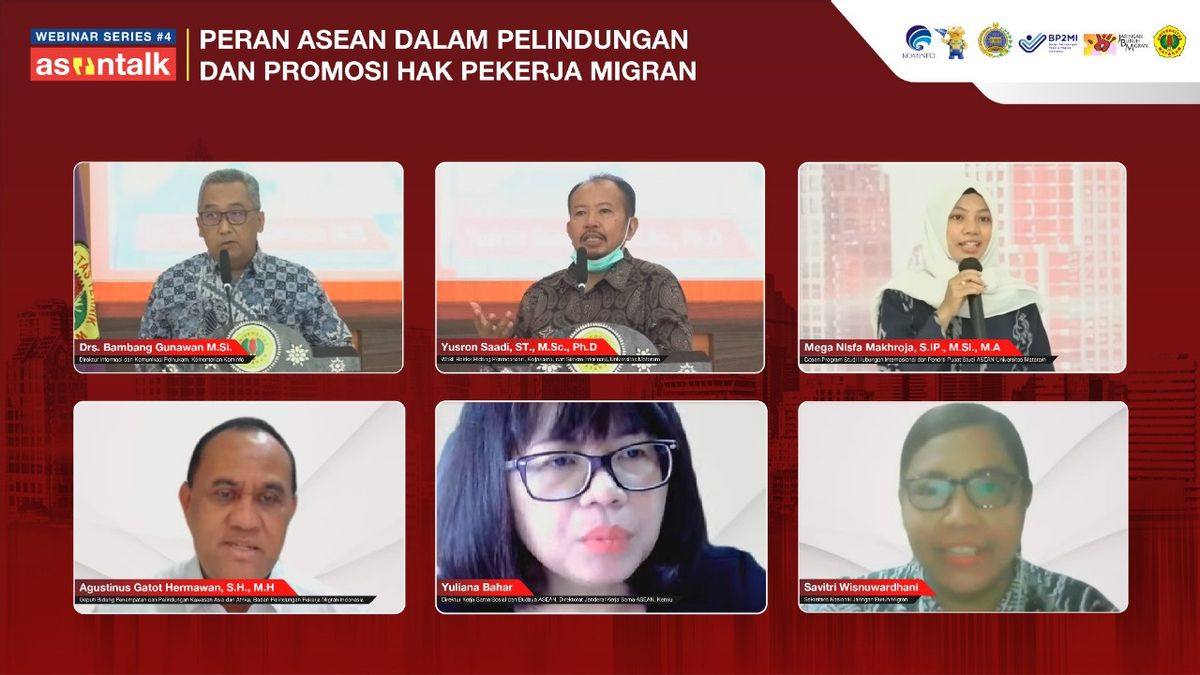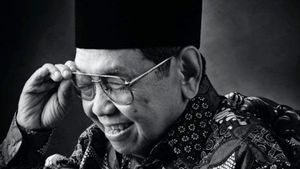JAKARTA - Director of Information and Communication of Polhukam, Ministry of Communications and Informatics, Bambang Gunawan said, the content of the consensus agreed at the 31st ASEAN Summit in Manila, Philippines, on November 14, 2017 seeks to improve the protection of migrant workers and their families in the ASEAN region. .
This was conveyed in his remarks at the Webinar Series #4 ASEAN Talk with the theme 'The Role of ASEAN in the Protection and Promotion of Migrant Workers' Rights in Lombok, Wednesday, June 13 yesterday.
"The contents of the consensus broadly regulate the rights of migrant workers, the obligations of sending countries, and the obligations of countries receiving migrant workers," he explained in an electronic message received in Jakarta, Thursday, July 14.
The sending country is responsible for providing an orientation program before departure which contains human rights, labor rights, working conditions, law, social, cultural and so on related to the receiving country and is responsible for fulfilling the health requirements for migrant workers.
"Recipient countries of migrant workers must also be responsible for ensuring the human rights and basic rights and dignity of migrant workers by providing fair treatment and preventing harsh, cruel and tortured treatment," he said.
Bambang said the large flow of labor migration between ASEAN countries was a good opportunity for economic cooperation if handled properly.
So far, according to him, efforts to resolve the problem of migrant workers tend to be carried out on a national scale by each ASEAN member country.
"The economic strengthening that has been agreed upon since 2017 as well as the spirit of collaboration between governments of ASEAN countries by building a comprehensive cross-border policy system and alignment will certainly be a big umbrella for the protection of migrant workers in ASEAN," said Bambang.
The event also started with remarks from the Vice Chancellor for Planning, Cooperation, and Information Systems, University of Mataram, Yusron Saadi.
Yusron said that the topic raised in this webinar is very appropriate because according to him, local people need to be given an understanding of the rights of migrant workers and the role of ASEAN in protecting migrant workers.
He also hopes that the campus as a producer of scholars will play a major role in helping to socialize or increase public understanding about the rights of migrant workers, and what institutions can help them in finding a better life.
“Socialization efforts like this are very important, especially in Lombok or NTB where there are quite a lot of migrant workers. Generally they are poorly educated, many are underage, and many stories are sad, heartbreaking. Hopefully it won't happen again in the future, including through activities like this," he concluded.
The speakers who attended included the Deputy for Placement and Protection for the Asian and African Region, the Indonesian Migrant Worker Protection Agency (BP2MI), Agustinus Gatot Hermawan, Director of ASEAN Social and Cultural Cooperation, Directorate of ASEAN Cooperation, Ministry of Foreign Affairs, Yuliana Bahar, Lecturer of the Relations Study Program. International and Researcher at the ASEAN Study Center, University of Mataram, Mega Nisfa Makhroja, and the National Secretary for Migrant Workers, Savitri Wisnuwardhani.
In his presentation, Agustinus Gatot Hermawan said that there were nine priority programs for BP2MI, including eradicating illegal PMI placement syndicates, strengthening institutions and reforming the bureaucracy, making PMI a VVIP, modernizing the system and integrated data collection, waiving placement fees, improving PMI governance, strengthening schemes. , economic and social empowerment, as well as increasing synergy and coordination.
“In a fundamental change, the paradigm of TKI was changed to Indonesian Migrant Workers (PMI). This is not just a change of name, but is also expected to make PMI more independent, successful, and of course competent, and in looking for work is not mobilized by brokers or sponsors," he explained.
Agustinus added that BP2MI must provide complete protection for migrant workers, namely protection given before PMI departs abroad, while abroad, or after abroad. According to him, this must cover aspects of social, legal and economic protection.
Meanwhile, the Director of ASEAN Social and Cultural Cooperation, Directorate General of ASEAN Cooperation, Ministry of Foreign Affairs, Yuliana Bahar filled the session by explaining about the employment sector in ASEAN which is one of the sectors discussed in the ASEAN socio-cultural cooperation sector. In this case, there are 3 pillars, namely, the pillars of politics and security, the pillars of economic cooperation and the pillars of socio-cultural cooperation.
He also believes that one of the main challenges in efforts to protect PMI in the ASEAN region cannot be separated from the situation and the ongoing impact of the Covid-19 pandemic. Because according to him, the pandemic presents its own challenges for protecting Indonesian citizens.
"For this reason, three main focuses of protection diplomacy are needed, namely accelerating digital transformation, increasing protection infrastructure and human resources, and developing legal frameworks and cooperation at national and international levels," he explained.
As a Lecturer of International Relations and Researcher of the ASEAN Study Center at the University of Mataram, Mega Nisfa Makhroja revealed that as a regional institution, ASEAN has a role to accommodate countries in the ASEAN region in order to create equality, prosperity and others. In addition, ASEAN also seeks to integrate education in order to create opportunities for the mobilization of high-skill labor.
"For students, the opportunities for migrant workers in ASEAN are very large, one of which is through education, especially higher education, which is the 'ninja way' to become professional migrant workers," he said.
In the next session, Savitri Wisnuwardhani explained the role of ASEAN in the protection and promotion of PMI rights. Such as efforts in realizing protection for PMIs, PMI organizations abroad that participate in realizing protection, including in handling Covid-19.
Savitri also revealed that there were several other problems experienced by PMIs, including missing PMI data, inappropriate education and training materials, falsification of work documents, limited public services, an unintegrated case handling system, and so on.
"Hopefully, migrant workers can better understand their rights," he explained.
In addition to providing material and asking questions by resource persons, the event was also enlivened by quizzes with prizes which were attended by all webinar participants from students, university students, and the general public.
This Webinar Series #4 aims to increase public understanding regarding the rights of migrant workers and the protection efforts undertaken by countries in the ASEAN region. Held hybridly (offline and online) in the Senate Meeting Room, Lt. 3, Rectorate Building, University of Mataram, and can be watched live through the Zoom Meeting application and the YouTube channel of the Directorate General of IKP Kominfo.
The English, Chinese, Japanese, Arabic, and French versions are automatically generated by the AI. So there may still be inaccuracies in translating, please always see Indonesian as our main language. (system supported by DigitalSiber.id)








